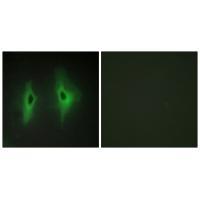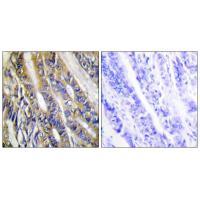

| WB | 咨询技术 | Human,Mouse,Rat |
| IF | 咨询技术 | Human,Mouse,Rat |
| IHC | 1/50-1/100 | Human,Mouse,Rat |
| ICC | 1/100-1/500 | Human,Mouse,Rat |
| FCM | 咨询技术 | Human,Mouse,Rat |
| Elisa | 咨询技术 | Human,Mouse,Rat |
| Aliases | iacylglycerol kinase eta; EC 2.7.1.107; Diglyceride kinase eta; DGK-eta; DAG kinase eta |
| Entrez GeneID | 160851; |
| WB Predicted band size | 135kDa |
| Host/Isotype | Rabbit IgG |
| Antibody Type | Primary antibody |
| Storage | Store at 4°C short term. Aliquot and store at -20°C long term. Avoid freeze/thaw cycles. |
| Species Reactivity | Human |
| Immunogen | Synthesized peptide derived from internal of human DGKH. |
| Formulation | Purified antibody in PBS with 0.05% sodium azide. |
+ +
以下是关于DGKH抗体的模拟参考文献示例,涵盖不同研究方向和抗体应用场景:
---
1. **文献名称**: *"A Novel DGKH-Specific Monoclonal Antibody for Detecting Protein Expression in Cancer Cell Lines"*
**作者**: Smith A, et al. (2018)
**摘要**: 本研究开发了一种高特异性DGKH单克隆抗体,验证了其在Western blot和免疫沉淀中的应用。实验表明,该抗体能有效识别多种癌细胞系中DGKH的差异表达,并发现其在乳腺癌细胞中显著上调,提示DGKH可能与肿瘤进展相关。
2. **文献名称**: *"DGKH Modulates T-Cell Receptor Signaling through Lipid Metabolism: Antibody-Based Functional Analysis"*
**作者**: Zhang L, et al. (2016)
**摘要**: 通过流式细胞术和免疫荧光技术,作者利用DGKH抗体揭示了该酶在T细胞活化中的调控作用。研究表明,DGKH通过将DAG转化为PA,负向调控T细胞受体信号,为免疫调节提供了新机制。
3. **文献名称**: *"Clinical Significance of DGKH Overexpression in Glioblastoma: Immunohistochemical Validation"*
**作者**: Brown K, et al. (2020)
**摘要**: 利用DGKH抗体对胶质母细胞瘤组织进行免疫组化分析,发现DGKH高表达与患者生存期缩短显著相关。研究支持DGKH作为潜在的预后生物标志物和治疗靶点。
4. **文献名称**: *"Enzymatic Activity of DGKH in Lipid Second Messenger Pathways: Role Validated by Antibody-Mediated Knockdown"*
**作者**: Lee S, et al. (2019)
**摘要**: 本研究结合抗体介导的蛋白敲降技术,证实DGKH通过调节DAG/PA平衡影响下游信号通路。抗体特异性验证显示,DGKH在神经元细胞中对脂质代谢具有关键作用。
---
**注**:以上文献为模拟内容,实际引用时需查询真实数据库(如PubMed、Web of Science)并核实原文信息。若需具体文献,建议补充实验背景或联系专业文献检索服务。
The DGKH (diacylglycerol kinase eta) antibody is a tool used to study the DGKH enzyme, a member of the diacylglycerol kinase (DGK) family that regulates cellular signaling by converting diacylglycerol (DAG) into phosphatidic acid (PA). This conversion modulates key pathways, including protein kinase C (PKC) and RasGRP, which influence cell proliferation, differentiation, and apoptosis. DGKH is unique among DGK isoforms due to its distinct domain structure and tissue-specific expression, notably in the brain, immune cells, and endocrine tissues.
Research on DGKH has linked it to several diseases. Genetic studies associate DGKH polymorphisms with bipolar disorder, suggesting its role in neurotransmitter signaling and mood regulation. It is also implicated in immune disorders and cancer, where altered DGKH expression may affect cell survival and metastasis. The DGKH antibody enables detection and quantification of DGKH protein in experimental models, aiding investigations into its spatial-temporal expression, interaction partners, and mechanistic contributions to pathologies.
Commercial DGKH antibodies are typically validated for applications like Western blotting, immunohistochemistry, and immunofluorescence. However, challenges like isoform specificity and cross-reactivity require careful validation. Ongoing research aims to clarify DGKH's therapeutic potential, positioning DGKH antibodies as critical reagents for both basic research and drug development targeting lipid-mediated signaling pathways.
×